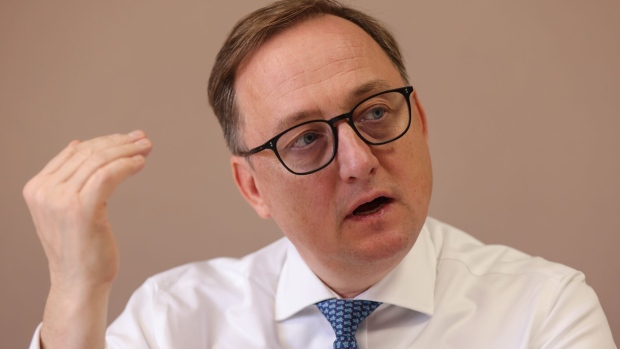Mar 8, 2024
ECB to Avoid ‘Autopilot’ on Rates Once Cuts Begin, Kazaks Says
, Bloomberg News

(Bloomberg) -- The European Central Bank won’t necessarily lower interest rates at every meeting once cuts commence, according to Governing Council member Martins Kazaks.
Monetary easing could include pauses along the way if conditions call for it, the Latvian central bank head told Bloomberg from Riga. While he didn’t exclude an eventual return to some form of forward guidance, he said it’s not appropriate now due to elevated uncertainty.
“The first cut will be important, because that will show that we’ve changed the path,” Kazaks said. “But in my view, it does not mean that we’re forced or obliged to cut each and every meeting.”
“The optionality is always there,” he added. “We don’t put anything on autopilot.”
The remarks come after President Christine Lagarde offered her strongest signal yet that the ECB will begin unwinding its unprecedented bout of rate hikes in June. That will allow officials to digest a string of upcoming data on wages — their main inflation focus at present — even as revised forecasts put price gains at the 2% target in 2025.
“Wage growth seems to be easing somewhat,” Kazaks said. “We see some leading indicators also pointing to the same direction.”
Even so, he cautioned that officials must “remain patient and cautious,” and that “there will never be a moment of perfect information.”
The Federal Reserve and the Bank of England are similarly assessing when it’s safe to begin loosening policy, with monetary authorities wary of jumping the gun and allowing inflation to bounce back.
Lagarde’s messaging did little to change the market’s view on the pace and scale of easing this year. An initial, quarter-point reduction in the deposit rate — currently 4% — remains priced for June, with another three expected by December.
Officials have long suggested that the risks of cutting too soon are bigger than holding on to the current level of interest rates for longer. Kazaks sees a more nuanced debate.
“Those risks of being too early and too late, I would say they are increasingly balanced,” he said.
The ECB’s weaker economic outlook suggests the bar for delaying any decreases beyond June is now higher, according to Krishna Guha, who heads global policy and central bank strategy at Evercore.
What’s more, “once the ECB starts, it will likely end up cutting on a more continuous and extended basis than is currently discounted in markets,” he said.
Kazaks said investors’ most recent bets for 2024 have become more consistent with the ECB’s outlook, though he stopped short of agreeing with the roughly 100 basis points of easing that are now priced for this year.
“It’s going be data dependent,” he said.
--With assistance from Alice Atkins, Alessandra Migliaccio, Christoph Rauwald, Greg Ritchie, Max Ramsay and Ben Sills.
©2024 Bloomberg L.P.






